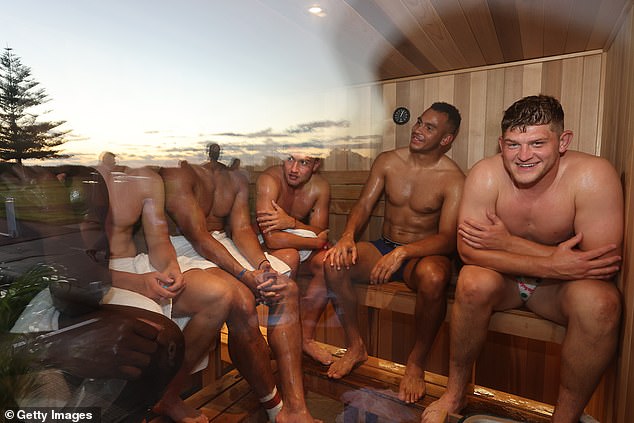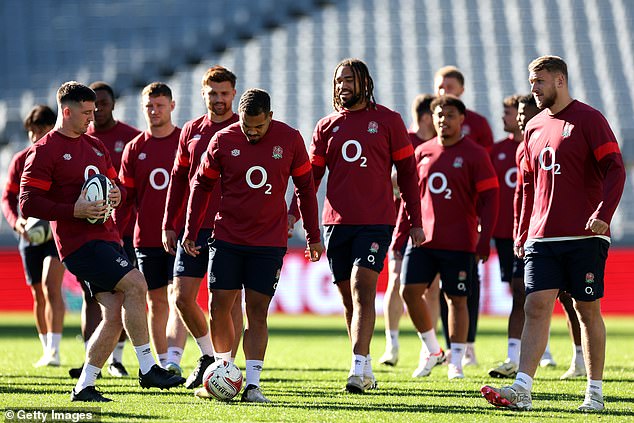EXCLUSIVEInside the England rugby camp: JAMIE GEORGE reveals his day-to-day diary of how they are preparing to beat the All Blacks - including Whoop bands, sleeping in until 2pm... and playing very little rugby!
- England will look to cap off their rollercoaster year by beating the All Blacks
- They lost the first game of the two-Test series last weekend, going down 16-15
- Jamie George took Mail Sport through a week's worth of recovery and training
England are at the end of a gruelling season which began more than a year ago, when the majority of the current squad were starting their preparations for the World Cup last autumn.
The players will summon up one last, herculean effort, just seven days after a blood-and-thunder encounter with the All Blacks in Dunedin.
Here, captain JAMIE GEORGE explains to Mail Sport's Chris Foy how he and his team-mates recover, repair and prepare for another punishing Test, a week after the last one…

Jamie George has revealed his day-to-day diary inside England's rugby camp in New Zealand

They will summon up one last Herculean effort against the All Blacks to round off their season
LAST SATURDAY
After losing the first Test by a point against the All Blacks, the medics come to each player and ask: 'Anything to report?' If it is anything from a stubbed toe to a rolled ankle, you report that. They'll be checking in throughout the week and you'll be getting treatment constantly.
There are always a few knocks and you recover in any way you can. If you have a dead leg or any bleeding, you put ice on that area. Otherwise, rehydration is the key.
When you play in a Test match, you weigh in and weigh out, to see how much water you've lost. Generally, it is between one and three kilos. Three kilos (7lbs) would be a lot. In Japan, it was a lot - more than in New Zealand where for me it was about one-and-a-half (3lb 5oz lost).
You rehydrate with water, salts and electrolytes, and you jump in an ice bath if there is one. There was one at the stadium, which was great. Then the message from Aled Walters, head of strength and conditioning, is that we can have a beer next weekend. So, you have to rein in your alcohol intake quite significantly and try to get an early night.
The best way we can recover is sleep and the guys are now wearing Whoop bands and other devices which track sleeping patterns. Steve Borthwick has spoken about trying to set sleeping records because that is the most important thing, so it's about who can sleep for the longest. Theo Dan is a ridiculous sleeper and a lot of the young lads can sleep for ages.
But you often end up having to play catch-up with sleep, on the back of a difficult Saturday night. Your mind ticks over. I get to sleep at 3 or 4am and wake up again at 8am, which is not enough.

Players can lose between one and three kilos of water after playing in brutal Test matches

Whoop bands (pictured on Chandler Cunningham-South's arm) track sleeping patterns
SUNDAY
A travel day, which makes it quite difficult. We do recovery in the morning before leaving Dunedin. We try to get in a pool or an ice bath and get some treatment from the physios. The main thing is to make sure we were all wearing our recovery leggings to improve blood flow, which aids muscle recovery.
Those are the big priorities, to make sure you are right for when we train again. Then we try to do more recovery when we get to the hotel in Auckland. By recovery, mostly I am talking about ice baths and using the sauna. Saunas are a big thing in rugby and there is an amazing one at the hotel. We all pile into there, then also into the ice, so it's about mixing up the hot and cold. You probably do a 15-minute stint in an ice bath; three to five minutes in it, out of it then back in again.
There is a performance meeting and we all feed back, then our head of medical reports to our head of performance, who chats to Steve. They have a good understanding of what we need. They also check the data from our game at the weekend.
That last game was always going to take a lot out of us. There is an emotional spike that comes from playing in a game like that, a come-down off the back of it and allowing yourself to feel rubbish for a couple of days.

The day after matches typically sees players make use of saunas to further recover

To mix up the hot and cold, players will also jump in ice baths for several 15-minute stints
MONDAY
It's mostly just a walk-through for us this week. We aren't on the field, but we go through a lot of detail. We do some gym work, but the priority is about making sure we feel right for Tuesday.
The big thing now is physio and soft-tissue massage. We will be seeing a physio and a soft-tissue therapist at least once a day.
After a game like last weekend, you really don't feel like yourself early in the week. Your legs still feel heavy and you have a lot of bumps and bruises. So, we shorten the amount of time we are on the grass, but that means we have to maximise the opportunity when we are on it. I think we've done that right.

Monday will be a walk-through for the rest of the week with legs still heavy from the last game
TUESDAY
We are in the gym and it is high intensity but probably a lot shorter than we are used to. That is based off the game-load from the week before and the fact it's the last week of the season. It's not too common that you bring it down that much. You still need to make sure that that intensity spike is quite high.
Tuesday is the big training day in our week. We don't do double-session days here, but we might do stuff in units after the session and gym beforehand, leading into a walk-through, then on to the field. All in, it's probably three hours in the morning. There are a lot of sore bodies and we are all still feeling it a bit following the match.
The emphasis is on trying to get a big sleep tonight. We go out for dinner, sometimes in small groups, sometimes as a big group. It's about getting out of the hotel, enjoying each other's company, then generally get back pretty early and be in bed to sleep for as long as you can.

Tuesday is the biggest training day of the week and players are then tasked with sleeping well
WEDNESDAY
This is a big recovery day. We try to make sure we are not on our feet for too long. Again, it is about using the sauna (to increase blood flow, meaning more oxygen to the muscles - good for growth and recovery), the ice bath (which reduces muscle soreness), soft-tissue therapy, physio.
THURSDAY
At 7am, we watch England beat the Netherlands at the Euros at our hotel. That leads to a bit of singing 'football's coming home' on the bus journey to training! We went nuts in the team room, it was unbelievable - I am a very proud Aston Villa fan!
Apparently, the footballers were watching our game on Saturday. Gareth Southgate texted Steve to say they were, which is quite cool; a great cross-over. We will miss the final in Germany, though, because we'll be in the air. Argh! We'll be relying on wifi.
After that, it's a similar training day to a Tuesday, but the phases aren't as long. On Tuesday, you might knock the ball on, but they will play it out until there is an end point - someone is tackled into touch or scores a try or whatever. But on Thursdays, they shorten it to three or four phases, so it's about tapering the running load as it is later in the week.
By this stage, all the recovery has really helped. I'm certainly feeling better than on Tuesday.

Sessions will be shortened on Thursdays and by then, recovery should have set in
FRIDAY
We've changed how we do things the day before a Test. Under Eddie Jones, the captain's run at the stadium used to be a training session and you would run through your first three plays, with boots on. But now it is a walk-and-talk exercise.
I've never been a massive fan of eve-of-match training sessions. We've never done them at Sarries and neither has Steve, so it is just a walk and talk, kickers kick at goal, I'll do some line-out throwing. It's up to you what you do.
We have meetings in the evening. If there's any sport on the TV, we get that on. Some players enjoy a bit of table tennis. It's a day where we try to chill and get as much sleep as possible.

The captain's run under Steve Borthwick is a walk and talk before a meeting in the evening
SATURDAY
We'll get more soft-tissue therapy in the morning, but it is recommended not to use the sauna or the ice bath in the 24 hours before a game.
On game day, we sleep in as long as we can, but there is a cut-off point. I think it was 2pm last week. Aled knows the science behind it and says there's no sleeping past 2pm for a 7pm game here.
The only other thing is -four hours before kick-off - we will do an activation. It will be in a room at the hotel, we will do some stretching, then some maximal effort things like medicine-ball slams or squat jumps - things which spike testosterone levels.
Again, there's science behind it but I'm not the man for that - I just do what I'm told! Doing those things make us feel good, then we go to the stadium, do the warm-ups and we're into the game.
Jamie George was talking to Chris Foy.





















































































































